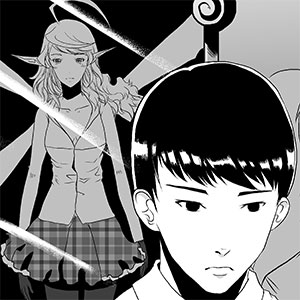My life was not so different from that of any other dream sylph. My specialty, when it comes to weaving, are pick-me-ups—those dreams that lift your spirits when things aren’t going your way. They are not the most powerful of dreams, or the most meaningful, yet I like to think they are important, giving a ray of hope in unhappy times.
Other sylphs will, from time to time, ask me to take a dream for those they regularly weave for on nights darker, in a sense, than most. On these occasions I will pick through their memories for things to brighten their night—sunlit parks remembered from childhood, friends far away, happy times long forgotten—add a dash of fantasy, and spin them into a world.
For the most part I have not lingered with any dreamer for long, moving from one to another, rarely forming any deep connection.
And then I met him.
I had been asked by a friend to weave a cheerful dream for an older woman who had fallen on particularly hard times. She spent her days upon a street corner taking handouts from passersby, and the weather had been as unkind as the people whose generosity she relied on. My friend was doing as much as any sylph can to help her make her way through the waking world, but this was a night on which my talent for cheer was appropriate.
In picking through her memories in search of things to lift her spirits, I discovered again and again the face of a young man whom she saw in passing each day. He would often give her some assistance, but what had caused such fondness for him was the warmth with which he acknowledged her, so different from the parade of disdain-filled faces she saw each day.
This intrigued me. My night’s work finished, I sought this man out and, not long after, volunteered to weave a dream for him.
He was a plain man, with a plain job which he had no particular fondness for. He had few friends, no close family, and no lover. He spoke rarely to others, so I could see why those around him in the waking world paid him little mind. Even another sylph might find little of interest if they did not know where to look.
Yet hidden among his humdrum memories were hints of a genuine kindness and concern for others that is ever so scarce in the city these days. This was why a woman whose path he crossed only during his daily commute would think so fondly of him. He did not offer her help out of pity, as most do, but out of the sense that she deserved more in life than she had. When he smiled at her, it was a smile from the heart.
We sylphs are acutely aware of the disconnect common among humans between outward expression and inward emotion. Many deny, even to themselves, the truth concealed behind their actions, but buried in their memories is the indelible evidence. You might be able to imagine my surprise, then, at finding nothing more than the outward warmth he projected and a subtle sense of camaraderie.
This enticed me to look deeper, and the more I looked the more I wished to know. Understand that dream sylphs feel emotions just as you do, but physical attraction has no meaning to us—we live, after all, in a world where gender, appearances, and the tangible trappings of allure are what we wish them to be. So, while his exterior might have been unremarkable, the depths of his mind were another thing entirely.
He was a daydreamer, with the most exquisite flights of fancy tucked among his memories. Daydreams, I should mention, are not like the true dreams we sylphs weave. Rather, they are ephemeral fragments created by the dreamer, lying on the far side of the barrier between here and the waking world, near ephemeral dreams born of fitful sleep.
So, as he sat at work surrounded by drab and routine, he would collect images of places lush and green and fantastic, and hold them close until he found time in private, when he would try to remember them, recreate them, give them form.
These were places of powerful beauty, places he longed deeply to visit but did not know where or how he might find them. I was struck by how familiar these images seemed—so like those worlds I would weave for others that it was as if he were the one reading my places of fantasy, not the other way around.
Yet while these imagined places brought him solace through the day, they also bound him, pulling him away from the connections to others that are the key to happiness.
As I perused his memories, the pervading sense of loneliness that hung over them saddened me. It was the product of a cycle wherein he would retreat inward to soothe his spirit, which only isolated him further from those around him. Though he denied it to himself, it was obvious he longed desperately for someone to love him, someone his plain facade and taciturn manner had thus far obstructed his search for.
I felt that this was a person I could do something for—the right dream might spur him to break out of this routine, to try and grab something more for himself.
But that sort of dream takes a great deal of time and thought, and I had only just begun to know him. While we can read almost any memory from the open book of the dreamer’s mind as they pass from the waking world into ours, that collection of memories does not tell us with certainty how they live in the moment, and thus how they will react to something unexpected. Or, in this case, how they might be enticed into initiating the unexpected themselves.
It was at this point that I made my first mistake. We sylphs are all actors, in a way, but I was not in a role in that dream. I was merely chatting with him.
For the sake of familiarity, I wore the form of a co-worker he was fond of. For setting, I chose an imagined place he had tucked away among his memories that day. It was a beautiful wooded hillside, and had a familiar air about it, like a park remembered from your childhood.
I expected nothing more in that dream than to develop a sense of what kind of man he was, but over the course of the conversation I could see him opening up, and as day approached, he asked something I have never been asked before: “Can I see you again?”
Now, he meant nothing by it—he was asking the woman from accounting—but for that instant it felt like he was asking to see me again. I admit to becoming flustered, and I gave the only reasonable answer: “Perhaps.”
And then he woke, and forgot about the dream, and that was that.













Comments (1)
See all